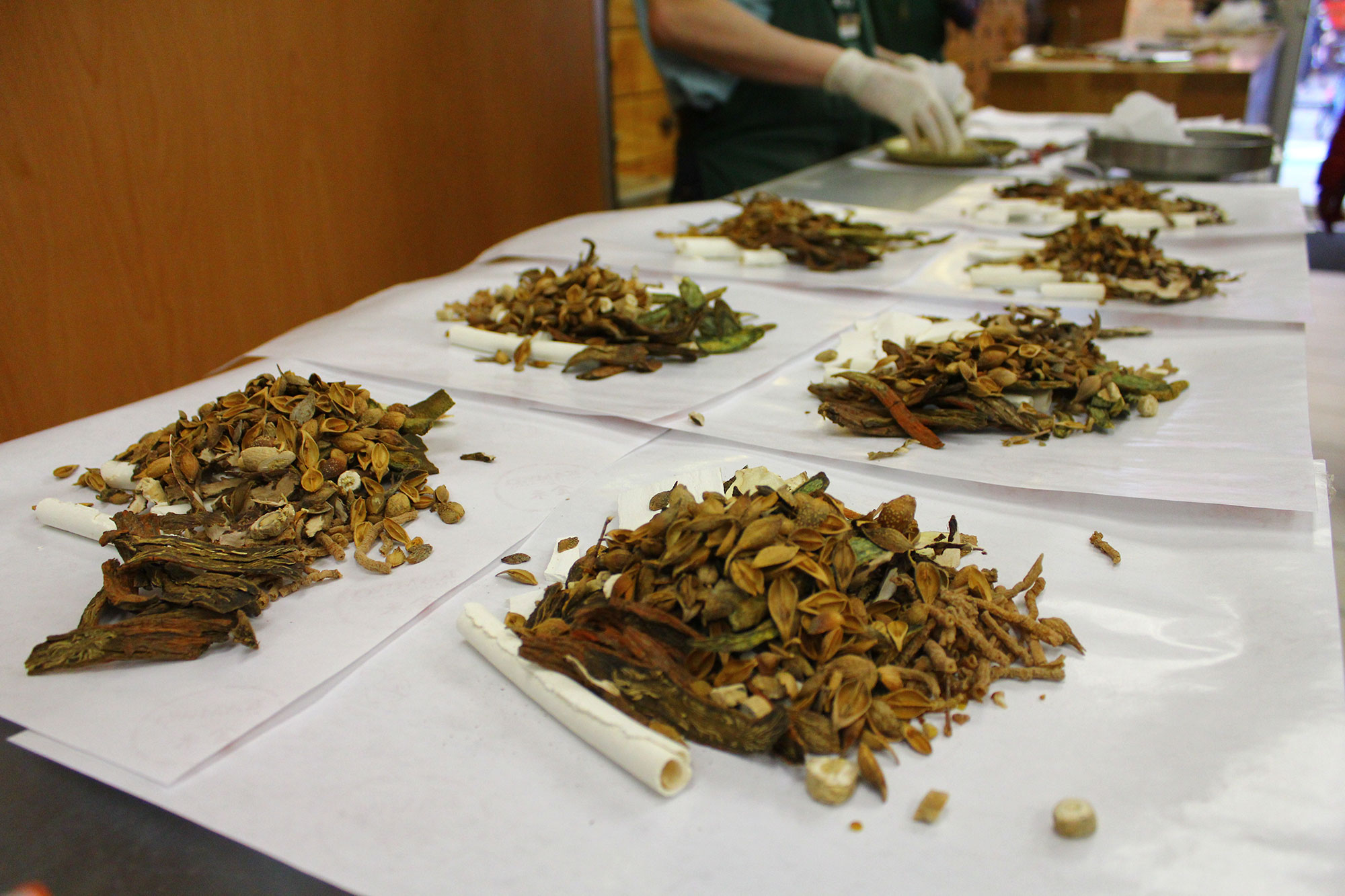
Herbal Pharmacy Experiences Growth During the Pandemic
One small business' unique model guaranteed their success.
Video by Manal Zahid Khan
Written Story Doyinsola Oladipo
Two middle-aged men in forest green aprons shuffle in front of a wall of at least 100 unlabeled chestnut wooden drawers in Kamwo Meridian Herbs, the largest herbal dispensary on the East Coast located in New York City’s Chinatown. Their gloved hands grip onto a bronze steelyard scale and randomly open drawers to reveal medicinal herbs from South Korea, India, the Arabian Peninsula, and Malaysia. They diligently weigh herbs like ginseng, myrrh, frankincense and place them onto crisp white cotton cloths. The men glance at sheets of paper covered in Mandarin characters and follow each line of text closely with a finger as they shift their gaze from a pile of herbs back to the sheet of paper. They are fulfilling online herb prescriptions which is incredibly lucrative for the near 50-year-old business.
Businesses struggled to stay open in Chinatown because of reduced foot traffic and the rise of anti-Asian racism during the pandemic. Chinatown businesses reported revenue losses of up to 80% in February 2020, according to AsAmNews. However, Kamwo Meridian Herbs was in a unique position compared to the rest of the neighborhood as it received record revenue at the onset of the pandemic. The herbal pharmacy met the growing demand for herbalism as the city searched for a cure to this new unknown virus.
The CEO of Kamwo Meridian Herbs says herbology has always been a part of the medicinal equation.
“Oftentimes in the media or popular culture, herbology is pitched like ‘are you for alternative medicine or are you for allopathic medicines,” says Thomas Leung, a pharmacist, herbalist, and CEO of Kamwo Meridian Herbs. Medicine is medicine, he says.
After practicing pharmacology for three years, an unfulfilled Leung returned to his family’s business founded in 1975 on Mott street. He aims to dispel the myths of herbology.
“People have this idea that [herbalogy] is some old Chinese guy behind a curtain in a dirty rundown flat. Hollywood does a terrible thing, they perpetuate this caricature, but it’s not true.” The majority of herbalists in the U.S. today are not of Chinese descent, he says.
The practice of herbology has grown exponentially in the U.S. since 2019. Herbal dietary supplement sales in the U.S. surpassed $10 billion for the first time in 2020, according to data from the Nutrition Business Journal. Herbal and fungal dietary supplements sales increased by 17.3% in 2020. This is the first time the segment experienced double-digit growth in at least the past two decades, according to the American Botanical Garden.
“We cater more to [individuals] outside of the neighborhood and that’s what we’ve been doing since the ‘90s,” says Leung. “Now, most of our customers are not Chinese.”
Kamwo fulfills herbal prescriptions filed by herbalists via the internet. Their business model, primarily digitization and growing customer base afforded the business a safety net during the uncertainty of the pandemic.
While one-fourth of the transactions in grocery stores and restaurants citywide were digital in 2020, only 3 percent were digital in Asian American communities in the city, according to Mastercard. This made it even more difficult for businesses that have not been able to recover from reduced foot traffic to rely on internet transactions. More than half of Asian-owned companies reported that their revenue dropped 75% or more last year, according to an Asian American Federation report and asian-owned businesses in NYC received less pandemic-era relief like PPP loans.
The pandemic is not the first time Kamwo has navigated changing demographics and traffic in the neighborhood. Leung witnessed the changes after the North American Free Trade Agreement was established which resulted in the closure of factories in the garment district in the ‘90s. The subsequent job losses impacted the community and resulted in an exodus of individuals to other boroughs and the suburbs.
“People come and people go, neighborhoods change, and Chinatown has gone through many changes,” he says. Leung is prepared to continue adapting to Chinatown’s changing demographics. His business depends on it.
“There’s an old joke in New York that if you don’t like the neighborhood you can wait it out.”